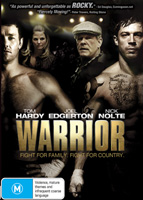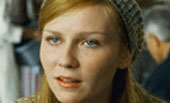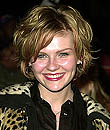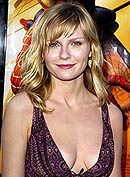Joel Edgerton Midnight Special
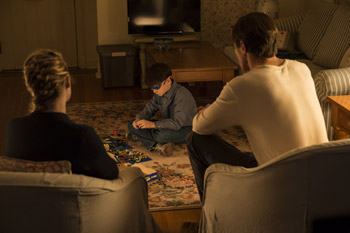
Joel Edgerton Midnight Special
Cast: Joel Edgerton, Adam Driver, Kirsten Dunst
Director: Jeff Nichols
Genre: Drama, Sci-Fi
Rated: M
Running Time: 112 minutes
Synopsis: Writer/director Jeff Nichols proves again that he is one of the most compelling storytellers of our time with the sci-fi thriller 'Midnight Special." A provocative, genre-defying film as supernatural as it is intimately human, it follows a father, Roy (Michael Shannon), who goes on the run to protect his young son, Alton (Jaeden Lieberher), a boy with mysterious powers that even Roy himself cannot comprehend.
What starts as a race from religious extremists and local law enforcement quickly escalates to a nationwide manhunt involving the highest levels of the Federal Government. Risking everything, Roy is committed to helping Alton reach his ultimate purpose, whatever that might be and whatever it costs, in a story that takes audiences on a perilous journey from Texas to the Florida coast, while exploring the bonds of love and trust, and the nature of faith.
Midnight Special
Release Date: April 21st, 2016
About The Production
On The Run
'What do you know about Alton Meyer?"
In the darkened room of a roadside motel, two armed and determined-looking men plan their next move. The windows are blocked with cardboard. As the evening news broadcasts the abduction of a young boy named Alton, the boy himself sits under a sheet on the floor, his face obscured by heavy goggles.
It's time to go.
But if this ominous scenario is what it appears to be, the child seems oddly serene. Who is Alton Meyer? Where are these men taking him? And is this a kidnapping, or some kind of daring escape? It's these questions and the deeper mystery that lies beyond them that drive the events in writer/director Jeff Nichols' 'Midnight Special," at once a supernatural thriller and an enigmatic and thought-provoking journey into the unknown…and the unknowable.
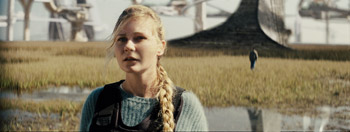 'I wanted to make a chase movie, a movie about guys moving on back roads through the American South in a fast car, driving at night with their lights off," Jeff Nichols begins, setting the stage for characters embarking on a collision course with something bigger than they imagine. 'They're on the run, they're being hunted and, at the same time, they're racing towards something important, though we don't immediately know what it is."
'I wanted to make a chase movie, a movie about guys moving on back roads through the American South in a fast car, driving at night with their lights off," Jeff Nichols begins, setting the stage for characters embarking on a collision course with something bigger than they imagine. 'They're on the run, they're being hunted and, at the same time, they're racing towards something important, though we don't immediately know what it is." But what appears on its face as an urgent but straightforward pursuit soon reveals layers of depth and a mystifying, otherworldly tenor. As the relationships between the fugitives and their pursuers come into sharper focus, the audience is taken along on an adventure the nature and magnitude of which they can only guess. Says Jeff Nichols, 'I often compare this film to the reverse of one of those Russian nesting dolls, which start out large and open up multiple times to produce smaller and smaller versions until you get down to the core. This starts with a kind of indie feel, where you're on the road with these guys, and then it gets progressively bigger and bigger until it falls off the edges of the frame."
In this case, the core is Alton, played by Jaeden Lieberher.
There's something very special, and possibly dangerous, about Alton. From his uncanny composure and sense of purpose beyond his years, to the inexplicable white light that emanates from his eyes and can either wreak stunning destruction or mesmerize people into a state of indescribable euphoria – albeit at great cost to his own increasingly fragile body – this is a child whose capabilities defy earthly explanation. As one of the story's central characters attests, in a way that could prove either chilling or reassuring: he's not like us.
Somehow, Alton can access and repeat highly technical classified information as effortlessly as tuning a television. It's these powers and abilities that have made him the prized possession of a religious cult that believes he's imparting messages from the Divine and, more recently, the object of a federal manhunt, as word reaches the highest levels of government that an eight-year-old is somehow intercepting top-secret military satellite transmissions.
Traveling with Alton are his father, Roy, played by Michael Shannon, and Roy's childhood friend Lucas, played by Joel Edgerton. Along the way they enlist the support of Alton's mother, Sarah, played by Kirsten Dunst. Committed to help Alton fulfill his destiny, they will leave behind the lives they knew and do things they never thought possible in a race towards a destination and an appointment that calls only to him. Barely a step behind are the police and the FBI, as well as the NSA, in the form of agent Sevier, played by Adam Driver, and the single-minded devotees of the Third Heaven Ranch, led by Sam Shepard as the charismatic and cagey Calvin.
'I appreciate the ambiguity of it," declares Michael Shannon, who has played an integral part in each of Nichols' previous films and returns to take the lead in 'Midnight Special." 'Most people have some mystery in their lives; they are confounded by certain unanswerable questions. I don't think Roy really knows what's happening with his son."
Nichols, who cites the mood and style of such 1980s sci-fi classics as 'Starman" among his artistic influences and inspirations, says, 'There's the suggestion that Alton is meant for something or somewhere else, that his powers are symptoms of what he's meant to do. As he starts to understand what his abilities are and take control of them, he starts to get healthier and better, whereas when his father tries to control them, for Alton's own sake, it actually makes him sicker. Roy and Lucas don't understand his capabilities. And we as the audience aren't supposed to understand them, either. In one way that's a metaphor for the fact that our kids are going to be who they are and we just have to have faith in that and let them go."
 In a larger sense, 'This is about belief in something you don't understand," Jeff Nichols continues, insofar as the story explores the nature of faith in its many forms, and the lengths to which people will go for what that means to them. 'What would you do if you knew your child was bound for somewhere you couldn't go?"
In a larger sense, 'This is about belief in something you don't understand," Jeff Nichols continues, insofar as the story explores the nature of faith in its many forms, and the lengths to which people will go for what that means to them. 'What would you do if you knew your child was bound for somewhere you couldn't go?" 'Midnight Special" is Jeff Nichols' fourth film. Structured as a fast-moving thriller with supernatural overtones, it is also, at its heart, about the love and trust between a parent and child. In that respect, it's indicative of Nichols' critically acclaimed body of work, from his auspicious debut with 'Shotgun Stories," to 'Take Shelter," which swept the Cannes Film Festival, and 2012's critical, festival and audience favourite 'Mud." Each has explored, in its own way, the transcendent and universal theme of family bonds.
Producer Sarah Green, marking her third collaboration with the director, notes, 'There are many elements that go into what makes a Jeff Nichols film. The reason I'm so drawn to his work, like many people, is that he can make a satisfying genre film, he can make a drama, he can make any kind of film and, no matter what, it will be heart-based. It's always about the human condition, and love. It's about how we relate to each other in the most pure way."
For Jeff Nichols, the idea for 'Midnight Special" harks back to a profoundly traumatic moment when his year-old son had a sudden medical emergency, plunging him into a panic. The situation was resolved and the boy was fine, but that agonising experience brought a flood of fears and insights to the first-time father, some of which Jeff Nichols sought to express in the film. 'I realised that having a child means giving up a part of yourself to the universe," he says. 'It's like a wound has opened up that will never heal and will always be open to injury. If something happens to that child, you will feel it because you love him so much. It's a helpless feeling, too, knowing that there is now this person in your life that you would do anything for, but in some ways you really have no control over. That was the basis for -Midnight Special.' -Take Shelter' was written by a man who was about to become a father, and all the anxiety that entails, while -Midnight Special' was written by a man who already is a father."
Another Jeff Nichols hallmark is the way he engages audiences to put the pieces of the story together as it unfolds, trusting them to make the vital links while he keeps the pace. 'I find it enormously rewarding because you're always moving forward," says Sarah Green, 'and when you get to the end you realise how everything worked together. It was all there, but it wasn't handed to you."
'So much of this film was about designing how to lay out the information and how people would receive it," says Jeff Nichols. 'Audiences are extraordinarily good at making connections between characters. It's how our brains work. When a movie starts, people immediately start processing information and putting the puzzle together, so it's a fascinating thing to play off, and play with. You can actually lead people in one direction and then bring something else up. If I defined every experience, that's all it would be; but if I allow some things to be defined by the audience it could be anything, and that's very exciting to me."
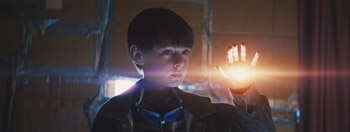 Cast And Characters
Cast And Characters 'Y'all don't know what you're dealing with, do you?"
In keeping with Jeff Nichols' storytelling style, some of the particulars of Roy's background and what brings him to this desperate point are stated outright, while others are implied, but audiences should have no difficulty assessing his mettle. As portrayed by Michael Shannon, Roy is a peaceful and thoughtful man, without ego or the need to prove something. Not prone to violence, he will nevertheless fight with everything he's got when it matters.
Roy and his wife were members of a cult, and within those confines Alton was born. When the boy began to exhibit unique powers, the cult's leader stepped in to 'adopt" him, as such an extraordinary child couldn't be raised by ordinary people. Alton's mother was likely excommunicated for her protests, while Roy took a different tack: silently planning and waiting for a chance to break free with the boy. 'From that moment," the director suggests, 'his goal was to make sure Alton was okay. And when it became clear that Alton needed to be somewhere else, Roy was determined to get him there."
As Michael Shannon sees it, 'Roy's son means more to him than anything. It's a feeling I can identify with, being a parent. It reconfigures your central nervous system. You can be a person who's kind of aimless, not quite sure of what's right and what's wrong, what's important and what isn't, but when you have a kid, all that changes. The second you pick them up… that's your child. And for Roy, no one is going to threaten that child or take him away without him doing something about it. It's a huge thing to be a father, and I love to see a filmmaker of Jeff's talents exploring that in a meaningful way."
Jeff Nichols' working relationship with Shannon is so well honed that they no longer rehearse. 'I will talk for days about back-story, where a character comes from and where he's going to end up five years from now. I enjoy that because I'm a writer and these are the relationships I created, so of course I want to sit down and talk about it," Jeff Nichols admits. 'Mike usually has one or two questions and that's about it. He understands the character. So when we show up on set we don't rehearse, we just start rolling. His style very much suits the way I write. He's able to hold such emotion in his face. I don't often have a lot of dialogue so something else needs to be going on, and Mike provides that for me."
Interestingly, much of what Roy does on Alton's behalf, he does on blind faith. 'I think he believes Alton is somehow in touch with something beyond our experience," Michael Shannon elaborates. 'There are a lot of people who believe there's more to the world and reality than we perceive; it's not an uncommon belief. Whether this power is coming from God or not, Roy feels that Alton is about to harness it, but he doesn't know the whole picture and he'd be the first to admit it. Roy doesn't have the full spectrum of what's going on with Alton, although he learns more throughout the movie. But it doesn't matter to him. It all comes back to the fact that this is his son, and he's going to protect his son, and he'd do the same thing whether this boy had special powers or not."
Casting the role of Alton led the filmmakers on a national search for a young actor who could reinforce that father-son bond with a minimum of dialogue. He would also have to be the conduit of an enormous, kinetic energy, while retaining the normal vulnerabilities of a child. Most importantly, Jeff Nichols explains, 'I needed him to have a maturity that develops and blossoms throughout the film, as Alton slowly awakens to his purpose."
Producer Kavanaugh-Jones recalls, 'We did an exhaustive recruit with a local casting director out of Austin, Texas, and thought it was going to be one of those needle-in-a-haystack situations. Then, at the end of another long day, our casting director in Los Angeles said, -You really should look at Jaeden Lieberher. He worked on a Cameron Crowe movie and he's spectacular.'"
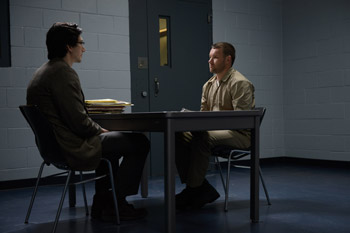 'Jaeden Lieberher is one of those rare young actors who is just uncanny," Jeff Nichols concurs. 'He came in and read for about five minutes, I talked to him and concluded that he was one of the smartest kids I'd ever met. He got it. He got the subtext and the situation; he knew what was going on. You can't fake that level of awareness and intelligence."
'Jaeden Lieberher is one of those rare young actors who is just uncanny," Jeff Nichols concurs. 'He came in and read for about five minutes, I talked to him and concluded that he was one of the smartest kids I'd ever met. He got it. He got the subtext and the situation; he knew what was going on. You can't fake that level of awareness and intelligence." As Jaeden Lieberher describes his character, 'Alton's a kid in the beginning, and then, as the story progresses, he becomes more of a leader, telling his family where they need to go. Before, he didn't understand and couldn't control his powers. The light coming out of his eyes caused him a lot of pain and he didn't know why it was happening. But he gains confidence."
The onscreen rapport between father and son owed much to the connection Shannon and Jaeden Lieberher shared from the onset. 'That's a relationship that's hard to pull out of thin air," Michael Shannon concedes, 'but I felt close to him right away. He trusted me and I trusted him. He's a wonderful young man, intelligent and respectful, and he takes what he's doing very seriously."
Taking on the role of Roy's old friend Lucas is Joel Edgerton. Initially an outsider, Lucas is first drawn into the flight through his relationship with Roy that pre-dates Roy's tenure on the Ranch, but he becomes fully committed after witnessing a measure of what Alton can do. It's something he can't explain, but that he also can't deny.
'In some ways Lucas is the audience," Joel Edgerton comments. 'He's caught a glimpse of something special and powerful, and decides to go on that journey and become a soldier to protect it. He cares for Alton and hopes that what he sees in his eyes is true. But he's not as familiar as Roy is with the things Alton can do. When he starts speaking Spanish and it turns out he's channeling a local radio station, or when he makes the earth shake, Lucas is experiencing these things for the first time, just like the audience."
'Lucas is an extremely rational and pragmatic person confronted with supernatural forces," adds Jeff Nichols. 'He constantly has to re-align what he thinks is the truth."
At times, Lucas' practical nature puts him seriously at odds with Roy, primarily where Alton's welfare is concerned. Undeniably, the boy is growing weaker. Yet every time Lucas suggests aborting the plan in favour of taking him to a hospital, Roy insists they stay the course. Says Shannon, 'Lucas is something of a gamble for Roy; he's not a sure thing. But I don't think Roy has a rolodex full of people he can call for help."
Here again, the quality of their history comes into play, as does the eventual revelation that Lucas is a State Trooper – a fact that makes his actions on the road all the more significant and puts him on a path from which we know he can never come back.
'Lucas also had to be soulful and even funny, at times," Jeff Nichols observes. 'Roy is so much in the trenches, emotionally, there's no room for levity because he's so damn serious. He has to be. So we need that counterpoint."
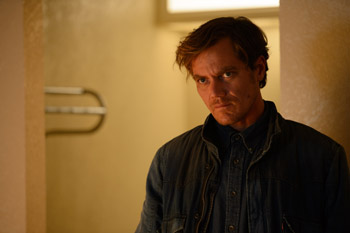 Joel Edgerton, an Aussie who perfected a Texas accent for the role, goes on to say: 'Though Lucas becomes part of this extended family, he remains an observer. He sees the nucleus of the family. He sees Sarah's maternal instincts, Roy's fierce protectiveness, and the potential for what might have been if these circumstances hadn't been placed upon them."
Joel Edgerton, an Aussie who perfected a Texas accent for the role, goes on to say: 'Though Lucas becomes part of this extended family, he remains an observer. He sees the nucleus of the family. He sees Sarah's maternal instincts, Roy's fierce protectiveness, and the potential for what might have been if these circumstances hadn't been placed upon them." Sarah's situation isn't easy. Estranged from her husband and son and conditioned by years of cult life, she appears at once emotional and reserved. 'Subdued," is how Kirsten Dunst describes it. 'Sarah has lived in solitude for so long, has been so lonely and so sad, and that does something to a person. It affects everything. Jeff Nichols and I talked about how to integrate that into the role so that it felt real."
Still, she says, 'I think when she and Alton see each other again, there's no doubt this is his mother. They come together immediately and it doesn't matter what happened or how long it's been. All she wants is for her son to be who he is and where he needs to be."
Before 'Midnight Special" was a film production, before it was even a script, certain moments took shape in Nichols' imagination, one of which was an image of Sarah that he says Kirsten Dunst now embodies. 'I dreamt of this shot, of her sitting on the stoop of a house with the camera slightly low and the porch bulb lighting the back of her head. I had that in my head for years and Kirsten Dunst suited it perfectly. She's very good at getting into the emotion of a scene. It can be a risky narrative move to begin with the relationship between a father and child and then, midway through, shift to the mother and child. You need to understand what they're going through, and you see all of that on her face."
Expressing the character's religious roots, Kirsten Dunst wore no discernible makeup. Though no longer a Ranch member, Sarah continues to dress in their traditional, modest manner, showing very little skin and keeping her hair in a long braid. Attired this way in the outside world, it serves to underscore her isolation – and perhaps also her commitment to do what she feels is right, no matter the shifting circumstances of her life.
Despite the group's precautions, traveling at night and trying to keep Alton's light contained, it becomes increasingly difficult to stay off the radar. Testing and gaining greater control of his once-unpredictable powers, Alton inevitably leaves clues in his wake.
As the FBI starts to closes in on something for which there is no precedent, they enlist the help of NSA agent Sevier, a bright, instinctual, backpack-toting analyst with a couple days' worth of beard, played by Adam Driver. He's not quite government-issue but that doesn't mean Sevier is any less focused on the job. He just takes a different approach.
'Sevier was probably bored right before he got this case and he's not used to being in the field," Driver suggests. 'Plus, the circumstances are so -out-there' that he's actually excited and interested in being there and trying to figure it all out. Being a part of that corporate structure and dealing with all the protocol and the cases, I think there would be so much room for cynicism but, instead, Sevier seems genuinely curious. That's what I liked about him when I read the script."
Jeff Nichols credits the actor with helping to make Sevier both credible and individual. 'Adam worked out details that I hadn't written or that maybe I'd only started to scratch the surface of. Sevier is very much an analog guy in a digital age, so he has this ridiculous recorder that he puts in front of subjects despite the fact that there are people sitting behind him typing every word into a Macintosh. He's writing on legal pads. He uses dry-erase boards and sticky notes. But I like that he's a tactile thinker, and Adam helped me to bring that out in a way that didn't feel silly but rather human."
Driver even took him by surprise, Nichols relates: 'In one of our first scenes, he comes in with his backpack and throws it down, and his knee hits the table. The backpack falls over and then he has to hunt for his pencil and paper and sort things out. I thought at the time, -Should I cut?' Then I realized he was doing it on purpose. It helps to give his character those qualities we discussed, and also makes him likeable, which is important."
Additionally, notes Sarah Green, 'Adam brings a little lightness to a heavy situation because he makes Sevier so charming and earnest."
But Sevier really shines when he's alone with his research. It's there, poring over transcripts of figures and coordinates Alton seemed to pull out of the air, that the agent finally sees patterns emerge. And he's astonished by what he discovers.
Charting these bits of data are nothing new to the members of the Third Heaven Ranch. Calvin Meyer, their formidable pastor and Alton's self-appointed guardian, has been incorporating them into his sermons ever since he decided the child's episodes of 'speaking in tongues" were prophetic messages from God, in a language they didn't yet understand but were duty-bound to decipher.
'What sets the Ranch apart from similar groups is that it appeared they had the manifestation of some kind of miracle in their midst," says Jeff Nichols. 'Calvin, who runs the place, is a pretty smart guy. You have to be fairly savvy and intelligent to command this number of people and convince them you have a direct link, and Sam Shepard leaves no doubt of that in his performance. I'd think if a person like that saw a boy with unique gifts born into his community, he would try to take ownership of that as quickly as possible." In fact, Calvin has pronounced the boy his own. As the spiritual focal point of life on the Ranch, Alton is an invaluable asset and one that he does not intend to lose if there's anything he can do about it.
'He's an interesting character," says Sam Shepard. 'Whenever someone comes up with a program about God, the idea is that all the questions are answerable if you only play along. It's the way people can be manipulated around a force that's answerable for all the questions we have: Why are we here? What happens after death? Why is there suffering? It's simplified. I don't think the issue is whether this guy takes advantage of that but does he really believe or is he pulling everyone's leg? I think he does believe."
For Jeff Nichols, Calvin and the Ranch provide a contrast to the story's idea of faith in the unknown, by providing a counterfeit version of it. 'When Mike Shannon first read the script he asked, -Why are we taking Alton to this place?,'" Jeff Nichols recounts. 'The answer is, -you don't know.' You can't explain it, but you believe it's important. This destination is important. And even more than that, what this boy needs to do is important and you have to have faith in that. So it made sense for him to begin that journey in this kind of faux environment of belief, this cult where Alton is used as a symbol of belief. What matters is what's between you and your child, knowing what you want for him and what he needs, and that's the kind of belief I was working on in this movie rather than a religious one."
Rounding out the main cast, Bill Camp and Scott Haze appear as dedicated Ranch cultists Doak and Levi. On Meyer's orders, the two are prepared to stop at nothing, including violence, to stop Roy and Lucas and bring the boy back to the fold where they are convinced he belongs. Paul Sparks is FBI Agent Miller, who launches the interrogation of Meyer and his followers and then brings in Sevier. David Jensen is a sympathetic ex-Ranch member, Elden, who provides the fugitives a brief way station – though it proves costly, with dramatic and unexpected consequences.
From Texas To Florida
'Alton, stay down."
'Midnight Special" follows Roy, Alton, Lucas and Sarah from the Third Heaven Ranch in New Mexico through Texas, Louisiana, Mississippi and Alabama, on their way to a specific site near the Florida coast. Portions of the film were shot in almost all of these places but the majority of footage was captured in and around New Orleans, including the North Shore communities of Mandevill, Covington and Lacombe, in the winter of 2014.
Former Ranch member Elden, who has spent years studying Alton's information in search of some unifying pattern, proffers the theory that they are geographic references possibly connected to Ley Lines – an ancient and supposedly mystic alignment of land masses around the world.
'It's voodoo science, but who knows," Jeff Nichols jokes, noting that 'in fact, there is a convergence of these Ley Lines in Florida."
The director assembled what has come to be known as his 'film family" for the shoot, a core group of behind-the-scenes talent, many of whom have been with him from his first feature. They include director of photography Adam Stone, production designer Chad Keith, editor Julie Monroe, and composer David Wingo.
Brian Kavanaugh-Jones, another longtime partner, says, 'We're so lucky to have this extraordinary crew and it's really a credit to Jeff Nichols that he builds the kind of working relationships that make people want to be here and be a part of it. It's like the continuity he creates with his stories."
Throughout principal photography, New Orleans and much of the South was gripped by record-breaking low temperatures. With a narrative heavy on road work and exterior locations, the shooting schedule was constantly being revised for rain and freezing temps. Location manager Mark Welch estimates Nichols and his team scouted close to 60 different stretches of road. They used at least six highways in and around southern Louisiana, as well as deserted roads, logging roads, two-lane country roads and portions of interstates.
Helicopters were used for aerial views of the action and onscreen as part of the police and military pursuit. Traffic control was an ongoing logistical challenge, often forcing production to shoot in three- or five-minute intervals. For one scene involving a police barricade and SWAT confrontation, a section of highway was briefly closed, while in other instances the crew employed a 'rolling roadblock," allowing vehicles to pass or follow 40 yards behind the process trailer and camera cars.
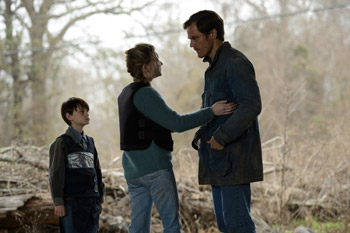 In some cases, production laid their own track, so to speak. 'We'll take a right turn, cut, and then we're actually 80 miles away from where we shot the last few feet but it's another dirt road that's a match," says Welch, who was one of three location managers. 'We shot a lot on the North Shore. On the North Shore of Lake Pontchartrain there are hardwoods and pines, and on the South are mostly oaks. We had to match the pines up to Florida so sometimes when they're supposed to be going through, say, Mississippi, we were on the North Shore trying to match the vegetation."
In some cases, production laid their own track, so to speak. 'We'll take a right turn, cut, and then we're actually 80 miles away from where we shot the last few feet but it's another dirt road that's a match," says Welch, who was one of three location managers. 'We shot a lot on the North Shore. On the North Shore of Lake Pontchartrain there are hardwoods and pines, and on the South are mostly oaks. We had to match the pines up to Florida so sometimes when they're supposed to be going through, say, Mississippi, we were on the North Shore trying to match the vegetation." Nichols sought a natural look, 'from the wardrobe and set dressing, to the lighting and locations, to the way Alton's powers emerge," he says.
Toward that end, he opted for film, not only for its realistic quality but also to challenge himself as a filmmaker. 'The reason you shoot on film is because it's the most organic representation of life…when it's daytime," Nichols notes. 'In daytime, nothing beats it. It lives and breathes and feels honest. The problem is, at night, this medium that allows such natural images completely changes because now you have to light it and it becomes artifice. If you roll a camera at night without lights, it's just black; it can't see like our eyes see. So I purposefully wrote a night-based story, knowing we would shoot on film, and knowing we would have to master how to light a film at night and make it look real.
'Luckily, I had one of the most amazing cinematographers and gaffers in the world working with me on this," Jeff Nichols continues. 'Adam Stone has been on all of my films and we've kind of grown and come into our own together. It's a relationship that only time and work can create. He's just flat-out talented. He has an eye. I never knew what that meant before getting into this business, but the way he shoots things…they just look better."
The special effects for Alton's extrasensory abilities required further manipulation of light. Says Nichols, 'We went to great lengths to create the beam from the boy's eyes. We shot anamorphic – which is the lens aspect ratio – using a very specific lens built by Panavision that give off natural flares if you point light right down the middle."
Together with special effects coordinator John McLeod, they designed and built so-called goggle rigs for the eye-gear Alton wears to protect himself and others from his intense white-light energy. Nichols explains, 'We built glasses with high-powered LEDs in the lenses so that whenever his eyes light up we had this rig aiming very bright light down the barrel of the camera lens. In instances where he had to light the entire frame, we couldn't have the goggle rig on him because the idea was that this only happened when his eyes were exposed, so we'd shoot that twice: once with the rig and once without it."
Light was woven throughout the film in myriad ways and became part of its aesthetic, whether from Alton's eyes or from bursts of headlights, flashlights, and street lamps.
Following the mandate for realism, the shoot leaned heavily toward practical locations. For the Third Heaven Ranch, the director envisioned a vast, open, arid landscape, so its exteriors were filmed in Mountainair, New Mexico, while interiors were found at a Christian camp outside of Folsom, Louisiana. The Jefferson Parish Correctional Center in Gretna, Louisiana, served for an FBI interrogation scene, as did the Stennis County Airport at MacDill Air Force Base in Biloxi, Mississippi, as government officials attempt to figure out what they're dealing with. A truck stop in Reserve, Louisiana, became the site of a mysterious satellite crash. Since the location was a working truck stop containing flammable petrochemicals, the FX department used a light box and squibs to simulate a propane explosion and falling debris.
For the motel scenes, Nichols wanted structures close to the highway so he could get the group leaving the room, heading for their car and taking off, all in one shot – a seemingly simple request that proved difficult to fulfill. A location scout of more than 100 possibilities finally pinpointed two motels that fit the bill. The Deluxe Inn in Slidell, Louisiana, is where cultists Doak and Levi catch up with the fugitives, and where the ensuing gunfight and race across a busy intersection at rush hour had to be supervised by local law enforcement. Mississippi's Fernwood Motel provided another stop along the way, with the advantage of its being shut down, so that production designer Chad Keith was able to borrow its furnishings to dress the two motel room sets they duplicated on a soundstage.
Elden's house was another combination of practical and stage sets. A modest, 1960s ranch-style house in Mandevill, much of its interior was recreated for a scene in which Alton's power is unintentionally unleashed and rises to literally earth-shaking levels. 'We doubled it for the stage so we could make the house vibrate and start to fall apart," says Keith. 'Everything needed to be built onto a hydraulic system."
Not surprisingly, this scene was a favourite of young Jaeden Lieberher. 'One place I had a lot of fun was at Elden's house, when the walls were splitting and I had the special effects glasses on so light was coming out of my eyes and everything was shaking," he says. 'When I read the script, I didn't know they were going to do it that way; I thought it was going to be visual effects or post-production. It was really cool."
Among the biggest stunt sequences is a car chase down a logging road, in which an SUV with Roy at the wheel runs over spike strips, crashes through a barricade and continues as far as he can take it, despite deployed airbags, deflated tires and shattered windows. The vehicle was rigged to flip via a catch-wire and take a barrel roll with the actors and the camera inside.
When the cars weren't on a tow rig, Shannon and Joel Edgerton took turns driving, often with Jeff Nichols and Stone crouching on the floor or in an open seat.
'Jeff wanted to create situations that were grave and seemed insurmountable and then find a way through them, but it had to be credible," says stunt coordinator Scott Rogers. 'You had to believe the car would keep going. We weren't trying to do crazy car stunts; it's all action that supports the story. We worked in pre-production on ways to create an amount of damage to the car that we felt it could sustain and still function."
Bringing The Themes Together
'He's not like us."
For the 'Midnight Special" score, Nichols reteamed with composer David Wingo, who provided the music for 'Mud" and 'Take Shelter." Starting early, the two brainstormed on sound and mood. Nichols recalls, 'If you listen to the scores of some of those -80s sci-fi films, they have a kind of pulsing electronic sound. I knew David would be good at that, but I didn't realize how good until he sent me a demo, something he called -just messing around,' and I listened to it every day on the way to the set. It's the song that opens the film and also plays over end credits. He took all that great inspiration and made a piece of music that wasn't derivative but was our music. It's sounds contemporary and throwback at the same time."
Wingo eschewed much of the current digital tools in favor of analog equipment, such as old-school Moog and Juno synthesizers.
At the same time, the coolness of the electronic soundscape had to be integrated with more emotional beats, in keeping with the story's themes. 'There was also some choral music that made it into the film, by a Norwegian composer named Ola Gjeilo," says Wingo. 'So I came up with some score of my own that fit in with that vibe, which is more spiritual and awe-inspiring, and where strings take a more prominent position. We talked about how the score holds back a little and then builds and blooms closer to the end. There are a lot of elements at work: the sci-fi, the chase, the supernatural, but for Jeff I know it only works if you are really moved by the relationships in the story."
'I'm a big fan of this score," Jeff Nichols declares. 'David is one of the greatest composers working today and I'm lucky to work with him. The opening and end credit theme speaks to the tone and the mystery of the story and it builds beautifully to more triumphant moments, with some very important emotional passages toward the conclusion. That was especially tricky because it has to help define a moment that's scary, and sad, as well as awe-inspiring and, ultimately, beautiful and loving. So there are a lot of things to compress into a score that also has to evoke the 1980s sci-fi vibe that we established at the start."
'I love the propulsive drive of this film," says Sarah Green. 'You start not knowing where you are or what the situation is. It looks very dangerous for this little boy. You get pieces of information as the story moves and you never come back to anything; you just keep moving forward. There are people after them with guns, things exploding, cars flipping… there's a lot of action. But it has an emotional punch."
That was Nichols' intention, from the moment he first started thinking about the story, before he had written a line or planned how to bring all of these elements together in a way that would engage and entertain audiences.
'I'm always writing on two tracks," he says. 'One track is about genre and plot, and in this case I wanted to pay homage to the sci-fi films of the -70s and -80s we all loved. I wanted to make a chase movie, a thriller, with guys running along back roads. But the other track is where I think about my own life, and try to attach the story to something emotional and personal for me, and hope that it will feel emotional and personal to other people."
Midnight Special
Release Date: April 21st, 2016
Have You Seen This?
MORE
- Mission: Impossible Fallout
- Glenn Close The Wife
- Allison Chhorn Stanley's Mouth Interview
- Benicio Del Toro Sicario: Day of the Soldado
- Dame Judi Dench Tea With The Dames
- Sandra Bullock Ocean's 8
- Chris Pratt Jurassic World: Fallen Kingdom
- Claudia Sangiorgi Dalimore and Michelle Grace...
- Rachel McAdams Disobedience Interview
- Sebastián Lelio and Alessandro Nivola...
- Perri Cummings Trench Interview


